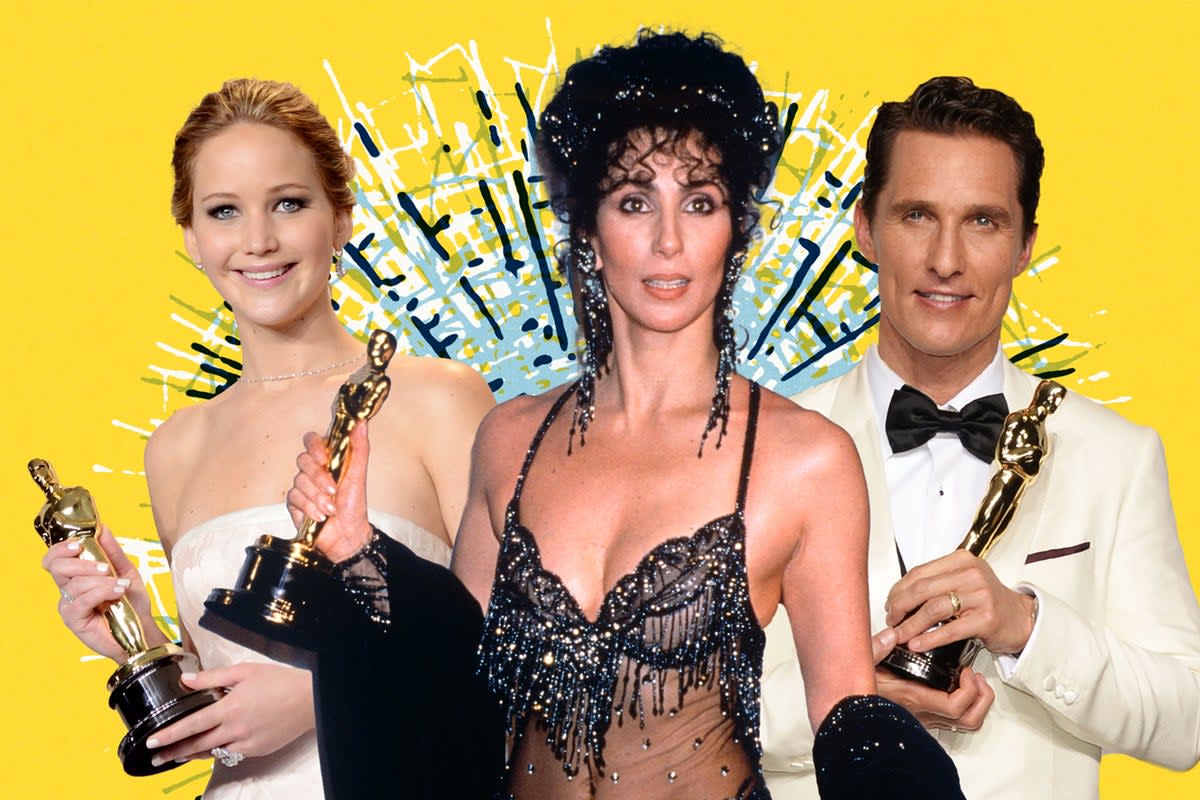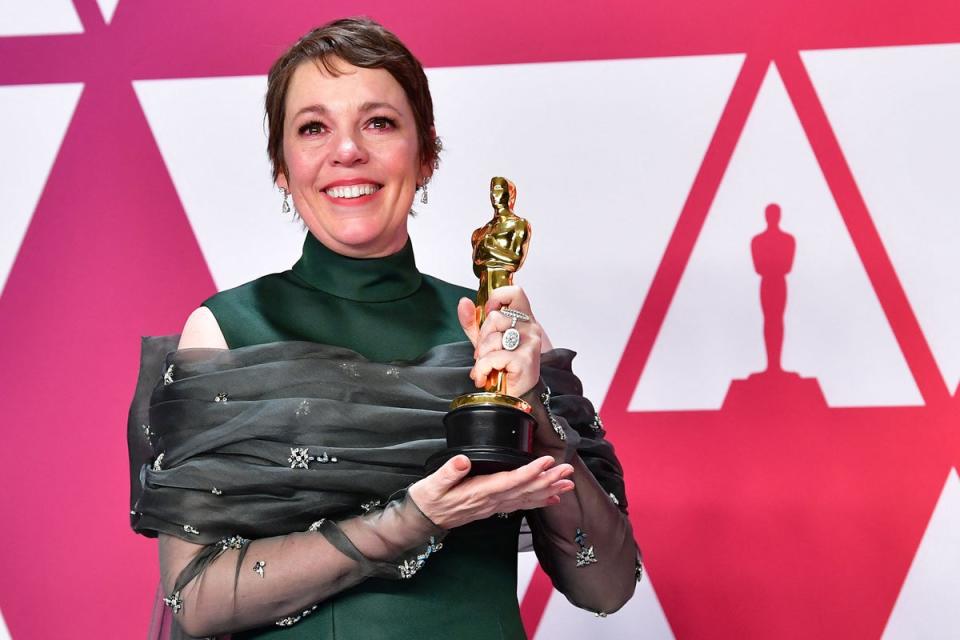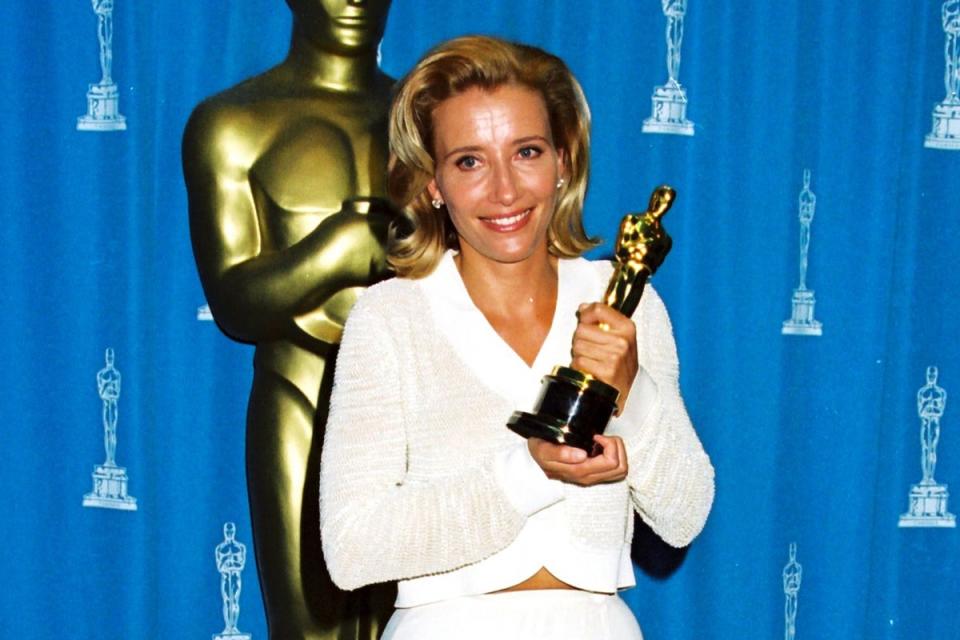From Olivia Colman to Cher, our favourite Oscar wins in history

Anyone who loves the Oscars will have their favourite Oscar wins – whether it’s a particularly memorable speech, an unexpected bit of category drama, or a long-in-the-works victory for a typically snubbed movie star.
These are the opposite of the more controversial wins. Instead they’re the really great ones, the wins that make the months and months of Oscar-centric rigamarole before the ceremony itself almost worth it.
Ahead of this weekend’s Oscars – which will likely create a handful of genuinely joyous wins – The Independent’s culture desk have selected their personal faves from Oscar history.
Tommy Lee Jones for The Fugitive in 1994 – as chosen by Louis Chilton
It’s no surprise that Tommy Lee Jones has won an Oscar. Even before we take into account his formidable acting chops, the No Country for Old Men star simply has the vibe of someone who could scowl at Academy voters until they handed him a statuette out of sheer terror. That’s (probably) not what happened in 1994, though, when Jones was awarded Best Supporting Actor for his role as dogged US marshal Sam Gerrard in Andrew Davis’s Harrison-Ford-on-the-lam thriller The Fugitive. Jones’s turn simply isn’t the type of performance that ever wins an Oscar: a hard-bitten cop in a brilliant, but not necessarily “elevated”, genre film. Yet the win was fully deserved; there’s a reason his dogged lawman spawned a thousand parodies.
Olivia Colman for The Favourite in 2019 – as chosen by Helen Coffey
Prior to her Oscar-winning performance in Yorgos Lanthimos’s The Favourite, Olivia Colman felt a bit like part of British telly furniture – like the nation’s favourite hilarious auntie, the one who would sweep in swathed in silver rings and colourful scarves and say rude words at the dinner table to make the kids laugh. She’d successfully made the switch from some of our best quirky, home-grown comedies – Peep Show, Green Wing, Flowers, Rev, Fleabag – to dramatic acting thanks to roles in Broadchurch and The Night Manager. But she felt very… domestic. America wouldn’t “get” her, we instinctively knew; she was a small-screen kinda gal.
Then she went and won the Best Actress Oscar for her stellar performance as Queen Anne in Lanthimos’s 2018 absurdist dark comedy. Suddenly, the whole world got to see what we’d always seen: how warm, funny, irreverent and outrageously charismatic Colman is. Up on that stage, within the course of two minutes, she delivered a teary but hysterical acceptance speech so perfectly unpolished (she blew a raspberry at one point) that she charmed an entire audience of A-listers, plus every single person who watched it. That speech catapulted Colman into new heights of career success, secured her “national treasure” status, and earned her a permanent spot in the hearts of myriads of people who’d never even heard of her before that night. I’m not sure the UK has ever been collectively prouder of one of our own.

Matthew McConaughey for Dallas Buyers Club in 2014 – as chosen by Tom Murray
It’s 2014 and Matthew McConaughey has just swaggered onto the Oscar stage in a white tuxedo jacket. He is about to deliver one of the most memorable Academy Awards speeches of all time. With the Best Actor win for his role as Ron Woodroof, a cowboy with Aids, in Dallas Buyers Club, McConaughey completed his McConaissance. The triumph cemented his return from romcom typecasting in Noughties films like The Wedding Planner and How to Lose a Guy in 10 Days, to auteur cinema. If McConaughey had never won this award, we might have never seen him in Interstellar or The Beach Bum – roles now synonymous with his name. Most importantly, we would not have heard that immortal speech, which now boasts 31 million views on YouTube, delivered in a way that only the Texas-born actor can. In his own words: “To that I say, Amen. To that I say, alright, alright, alright. To that I say, just keep living.”
Parasite wins Best Picture in 2020 – as chosen by Kevin E G Perry
It wasn’t supposed to happen. Bong Joon-Ho was already several drinks to the good, having declared gleefully after winning Best Original Screenplay and Best International Film: “I am ready to drink tonight until next morning.” The director could be forgiven for thinking his night had already peaked. Going into the 2020 Oscars, the strong favourite to take home the Best Picture prize was Sam Mendes’s war film 1917. The odds were firmly stacked against Parasite – nevermind that no film not in the English language had ever won the Academy’s top prize, but Bong’s razor sharp class and capitalism satire just seemed too sly and subversive to triumph at a ceremony that the previous year had given its biggest prize to Green Book.
Yet somehow Parasite swept the board, and Bong added both Best Director and Best Picture to his haul. It was a triumph as deserved as it was unexpected, and one that promised to usher in a new era of international cinematic appreciation. Ironically, it was a catty line Bong uttered at rival awards bash the Golden Globes that seemed to sum it up best. “Once you overcome the one-inch tall barrier of subtitles,” he’d said, “You will be introduced to so many more amazing films.”
Jennifer Lawrence for Silver Linings Playbook in 2013 – as chosen by Jacob Stolworthy
Each awards season, there are a slew of expected – and somewhat staid – Oscar nominations that go on to win awards. But there is also a peppering of the more invigorating nominees who should go onto win, but absolutely won’t. Every so often, though, an Oscars ceremony comes around in which the stars align and the most deserving recipient achieves victory at what could be perceived to be the perfect time in their career. This year’s example will certainly be Da’Vine Joy Randolph, a Supporting Actress nominee for The Holdovers – but one that looms in the memory is Jennifer Lawrence’s Best Actress win for Silver Linings Playbook in 2013.
It wasn’t Lawrence’s first nomination – she received recognition for her understatedly brilliant work in Winter’s Bone in 2011 – but her win was the apotheosis of a busy two years that saw the actor, seemingly effortlessly, wind her way up the Hollywood ladder, cementing herself as the world’s biggest film star in the process. In fact, that year was perhaps the last ceremony where all four most-deserving actors won – Daniel Day-Lewis (Lincoln), Anne Hathaway (Les Misérables), Christoph Waltz (Django Unchained) – and while Lawrence almost upstaged her own win by falling over on her way to the stage, it felt as close to Oscars magic the ceremony has managed in over a decade.

Emma Thompson for Sense and Sensibility in 1996 – as chosen by Jessie Thompson
There will always be a special place in my heart for Marion Cotillard and Colin Firth’s winning reactions – hers for La Vie en Rose (2007) a kind of extremely un-chic, un-French gushing, his for The King’s Speech (2010) an utterly British grunt before a threat to break into dance moves. But my favourite Oscar win of all time has to be Emma Thompson bagging Best Adapted Screenplay for her divine version of Jane Austen’s Sense and Sensibility, in which she also played Elinor Dashwood. Fresh from the heartbreak of divorcing first husband Kenneth Branagh, who had cheated on her with Helena Bonham Carter, Thompson sits beside her mother Phyllida Law. She’d just been to Austen’s grave, she told the audience, “to pay my respects, and tell her about the grosses”. Thompson has since described the depression she’d felt around that breakup – but this film, in which she also met her husband Greg Wise, seemed to mark a turning point in her life. It’s a joy to see her in the act of rising from the flames, triumphing for the ineffable charm and wit that have always made her one of our most supremely lovable stars.
Cher for Moonstruck in 1988 – as chosen by Adam White
No one will want to imagine the day in which Cher shuffles off this mortal coil – a day hopefully so far off in the future that her funeral procession will take place amid flying cars, a national day of mourning declared by president Blue Ivy Carter. But when that day does arrive, I will be satiated by the knowledge that she’ll die with an Oscar. Pop stars aren’t historically fantastic actors, let alone Academy Award winners, but Cher isn’t built like most pop stars. Her work in the 1987 romantic drama Moonstruck is seminal stuff – a piece of pure, soulful, emotional wizardry as she transforms from yearning widow to glamorous heroine per the sheer magic of the night sky. Cher’s win is occasionally invoked as a win that shouldn’t have happened, as if she robbed the perennially snubbed Glenn Close of an Oscar that year for Fatal Attraction. But this is a dreadful take! Yes, Close is spectacular in Fatal Attraction. As is fellow nominee Holly Hunter in Broadcast News. But it’s Cher! Academy Award for Best Actress winner Cher! Inscribe it on her tomb! Hell, inscribe it on mine!

 Yahoo News
Yahoo News 
